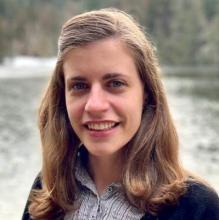Anne-Cécile Delaisse
Why did you decide to pursue a graduate degree?
I initially intended to become an Occupational Therapist in France, my country of origin. However, during my Occupational Therapy training, I became interested in the theory supporting practice and especially the core concept of occupation that is studied in more depth and across broader contexts in the discipline of Occupational Science. I decided to pursue a research career and I applied to different Occupational Science programs internationally.
Why did you decide to study at UBC?
I took part in an Occupational Science conference where I met my current supervisor, Dr Suzanne Huot. Her research about Francophone immigration resonated with my personal experiences of migration and international travel. I was interested in how she applies Occupational Science concepts beyond occupational therapy practice, to inform public policies and community practices with regard to migration and settlement. Dr. Huot encouraged me to apply to UBC. I was excited to have found one of the few universities and programs that allows students to do Occupational Science research while connecting to migration studies and social sciences more broadly.
What is it specifically, that your program offers, that attracted you?
When completing my MSc in Rehabilitation sciences, I learnt more about Occupational Science and I was able to situate my research on migration, in that discipline. Moreover, collaborating on many different projects in Dr. Huot’s lab provided me with key research skills and great opportunities to develop my career. By pursuing my PhD in the same program and under the same supervisor, I am able to keep an Occupational Science lens in my work, continue my involvement in Dr. Huot’s research program about Francophone immigration while conducting my own dissertation project about Vietnamese immigrants in Canada and France.
What was the best surprise about UBC or life in Vancouver?
I have been amazed by how much financial, emotional and academic support I receive from my supervisor, the faculty, my program and the university. It is invaluable to be surrounded by a community that has your success and best interest at heart. Beyond the stimulating academic environment, the UBC campus is also a beautiful natural environment
What aspects of your life or career before now have best prepared you for your UBC graduate program?
I have travelled in multiple countries and I have lived a year in Ho Chi Minh City, Vietnam. These experiences are key to my understanding of migration as well as the post-colonial dynamics that I examine in my research.
What advice do you have for new graduate students?
Graduate school allows you to take time to learn and do research about the things you are passionate about. You are given a lot of freedom and support. Take advantage of this unique and privileged opportunity to its fullest!

